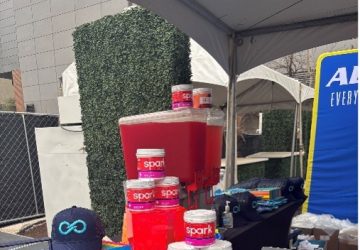The importance of maintaining proper hydration levels is not a new concept. Most of us around the country are now in the midst of rising temperatures and summer heat. Naturally, the need for consistent, increased hydration is sure to follow.
Hydration may seem like a dry topic, but there is more to it than just drinking water. Tweet This! Many people may not realize that hydration levels can affect everything from essential bodily functions to mental and physical performance levels.
In fact, in 1996 the American College of Sports Medicine (ACSM) stated, “During exercise, athletes should start drinking early and at regular intervals in an attempt to consume fluids at a rate sufficient to replace all the water lost through sweating (i.e., body weight loss), or consume the maximal amount that can be tolerated.”
Outdoor Training.
Outdoor training season is just around the corner for many athletes. Now is the time to start preparing your mind – and your body – for training during the remaining hot days of summer. Hydration is a key component in maintaining optimal health, wellness and athletic performance. No matter what part of the country you’re from or the climate in which you live, hydration plays a vital role in supporting the body’s overall nutritional needs. Tweet This!
The ACSM revised its guideline in 2007 to include the more conservative (if slightly vague) statement that…
“The goal of drinking during exercise is to prevent excessive (greater than two percent body weight loss from water deficit) dehydration and excessive changes in electrolyte balance to avert compromised performance.”
We know that hydration is important during those beautiful mild spring days but also during the blistering hot days of summertime. It is equally important during winter and colder climates. We typically don’t think of cold weather exercise and dehydration. Sweating does occur in the cold, but it evaporates much quicker in the cold air. Tweet This!
How important is hydration during cold weather?
The cold weather causes our blood vessels to constrict which can prevent blood from flowing to our extremities causing the body to conserve heat by drawing more blood to its core. When this occurs it makes the body think that it is hydrated. As the exercises or training continues, you won’t feel as thirsty. With a diminished thirst response and increased urinary output dehydration can occur quickly.
As we exercise, train and compete, fluid is integral to normal muscular function during these activities. Tweet This! Loss of fluids via sweat and expending of calories can be contributing factors to muscle cramps and dehydration.
Our bodies utilize fluids to help dissipate heat. If that ability is lost, you can easily succumb to heat illness – a very serious spectrum of heat-related health consequences that require immediate medical intervention.
Electrolytes.
One thing to consider is that as your body sweats, in addition to losing water, you begin losing electrolytes – minerals in the body that are essential to keep it functioning properly, too. During extended periods of exercise electrolytes may need to be replaced mid-workout. Tweet This!
So, as we hydrate during our activity it is important to replace some of those calories while rehydrating. One of my favorite ways to support optimal hydration levels before, during and post-exercise, is with AdvoCare Rehydrate®. What’s yours?
Sports Advisory Council Members are compensated for their role on the AdvoCare Sports Advisory Council.
[wpforms id=”848″ title=”true” description=”true”]





